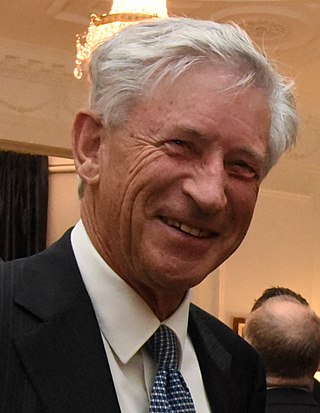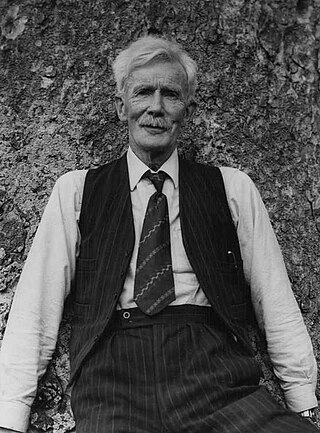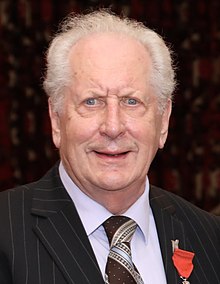
Sir Edmund Percival Hillary was a New Zealand mountaineer, explorer, and philanthropist. On 29 May 1953, Hillary and Sherpa mountaineer Tenzing Norgay became the first climbers confirmed to have reached the summit of Mount Everest. They were part of the ninth British expedition to Everest, led by John Hunt. From 1985 to 1988 he served as New Zealand's High Commissioner to India and Bangladesh and concurrently as Ambassador to Nepal.

Sir Edward William Stafford served as the third premier of New Zealand on three occasions in the mid 19th century. His total time in office is the longest of any leader without a political party. He is described as pragmatic, logical, and clear-sighted.

The Musket Wars were a series of as many as 3,000 battles and raids fought throughout New Zealand among Māori between 1806 and 1845, after Māori first obtained muskets and then engaged in an intertribal arms race in order to gain territory or seek revenge for past defeats. The battles resulted in the deaths of between 20,000 and 40,000 people and the enslavement of tens of thousands of Māori and significantly altered the rohe, or tribal territorial boundaries, before the signing of the Treaty of Waitangi in 1840. The Musket Wars reached their peak in the 1830s, with smaller conflicts between iwi continuing until the mid 1840s; some historians argue the New Zealand Wars were a continuation of the Musket Wars. The increased use of muskets in intertribal warfare led to changes in the design of pā fortifications, which later benefited Māori when engaged in battles with colonial forces during the New Zealand Wars.

The 39th New Zealand Parliament was a term of the Parliament of New Zealand which began with the general election held on 25 November 1978, and finished with the general election held on 28 November 1981. The dates of the Muldoon Ministry were from 13 December 1978 to 11 December 1981.

Philip Ralph Burdon is a former New Zealand politician and lawyer by profession. He was the co-founder of Meadow Mushrooms.

The 40th New Zealand Parliament was a term of the Parliament of New Zealand. Its composition was determined by the 1981 election, and it sat until the 1984 election.

Sir Alfred Hamish Reed, generally known as A.H. Reed, was a New Zealand publisher, author and entrepreneur.
Sir Edmund Walter Thomas, widely known as Ted Thomas, is a New Zealand jurist. He is a retired judge of the Court of Appeal of New Zealand and a former acting judge of the Supreme Court of New Zealand.
Reed Publishing (NZ) Ltd was one of the leading publishers in New Zealand. It was founded by Alfred Hamish Reed and his wife Isabel in 1907. Reed's nephew Alexander Wyclif Reed joined the firm in 1925. It was a New Zealand literature specialist and general titles publisher, releasing over 100 titles a year including a number of significant New Zealand authors such as Barry Crump, Janet Frame and Witi Ihimaera.

Alfred Saunders was a New Zealand farmer, reformer, temperance advocate and politician. He was Superintendent of Nelson Province and represented several electorate in the House of Representatives.
Alexander Hare McLintock was a New Zealand teacher, university lecturer, historian and artist. He edited and authored the three-volume Encyclopaedia of New Zealand, published in 1966, his final and perhaps his most remembered work.
Ernest Charles Empson was a New Zealand pianist and piano teacher. He was born in Ashburton, New Zealand, on 9 March 1880.
The First Stafford Ministry was the third responsible government to be formed in New Zealand, and the first to last more than a few weeks. It formed in June 1856, and lasted until July 1861. As the office of Premier had yet to be established, Edward Stafford served as head of the government, although initially Henry Sewell was the Minister who reported to the Governor.
The Domett Ministry was a responsible government which held power in New Zealand from August 1862 to October 1863. Although Alfred Domett was the head of the government, he was never appointed Premier as that office had yet to be established. Instead, he was Colonial Secretary and Secretary for Crown Lands.
The Second Fox Ministry was a responsible government which held power in New Zealand from July 1861 to August 1862. Although William Fox was the head of the government, he was never appointed Premier as that office had yet to be established. Instead, he was Attorney-General and then Colonial Secretary.
The Whitaker-Fox Ministry was a responsible government which held power in New Zealand from October 1863 to November 1864. Although Frederick Whitaker was the head of the government, he was never appointed Premier as that office had yet to be established. Instead, he was Attorney-General sitting in the Legislative Council while William Fox led the Government in the lower house.
The Third Fox Ministry was a responsible government which held power in New Zealand from June 1869 to September 1872. Although William Fox was the head of the government, he was never appointed Premier as that office had yet to be established, although he did resign the office at the end of his tenure. The Ministry was also known as the Fox-Vogel Ministry as most of the agenda was set by the Treasurer, while Fox busied himself with administrative affairs and moral crusades such as the attempted introduction of local option polls for liquor licensing.
The Third Stafford Ministry was the tenth responsible government to be formed in New Zealand, and lasted for a month.
The Fourth Fox Ministry was a responsible government which held power in New Zealand from March to April 1873.
The Second Stafford Ministry was the eighth responsible government to be formed in New Zealand, and one of the longer-lasting ministries during this period. It formed in October 1865 and lasted until June 1869. However, it was defeated in a vote of confidence on 15 August 1866 and resigned, to be reconstituted with three ministers replaced, so some contemporaries regarded it as two separate Ministries. As the office of Premier had yet to be formally established, Edward Stafford did not carry this title officially.







